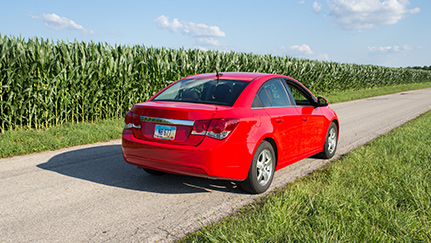
What affects the price of auto insurance and how big of a role does your driving history play when it comes to insurance? When it comes to understanding how rates are calculated, several misconceptions could be impacting your car-buying decisions. But the fact is, many of them may not be true.
Below you’ll find a list of the major misconceptions and some information to help you make an informed decision about car insurance.
1. Red cars cost more to insure than other colors
Do red cars cost more to insure? While there’s a rumor floating around that red cars will cost you more, the car’s color is not a factor in how your insurance is calculated. The make and model of a car will affect it, but not the color.
2. The more expensive the car, the more it costs to insure
The purchase price doesn’t have as much of an effect on the cost of your premium as the repair costs. Some mid-priced cars will cost more to insure than luxury cars because they have a higher loss history, or they might just cost more to repair. Always check with your insurance agent before buying a car to avoid surprises on the new premium.
3. Getting a traffic ticket will automatically increase the price of your premiums
While getting a ticket is never a good thing, if your violation is minor and your record is clean overall, it may not cause an increase in your rates. In fact, in some states you can take classes to reduce or remove the number of points from your license, which will lower your premium. But, remember, your rates can be affected if you have multiple traffic tickets.
4. It’s fine to carry only state-minimum liability insurance
Although most states require drivers to carry a certain amount of liability insurance, that amount is most likely not going to be enough if you have an accident. Buying the minimum means you will pay more out-of-pocket costs if you have an accident, which can run very high. Talk with your agent to determine the right amount for you based on your individual driving habits and financial situation.
5. Your credit doesn’t affect your insurance rates
Many factors can go into calculating your insurance rates, including your age, driving record and history of making claims. So can your credit history, which indicates how quickly you will pay off a loan.
Most states allow insurance companies to use credit scores for setting rates because people with higher scores tend to have fewer accidents. That means they cost less for insurance companies.
6. Comprehensive insurance covers everything
Comprehensive insurance covers a lot, but it’s designed for things not covered by other types of insurance on your policy, such as collision or uninsured motorist. You’ll need it for such things as fire, weather events like hail and floods, or a collision with an animal. In other words, it’s for the damage done to your car in an event other than a collision.
The truth of the matter
There are factors affecting your rates of which you might not be aware. These include the safety features included on your car; when, where and how much your car is driven; and even where it is parked overnight.
You can also change the rate you are paying with such things as a good-driver discount, a discount for carrying multiple policies with the same company and, for teenage drivers, a discount for being a good student.
The bottom line: it’s always good to check with your insurance agent to see what discounts you might qualify for, and what factors you can control to change the price of your insurance premium.
